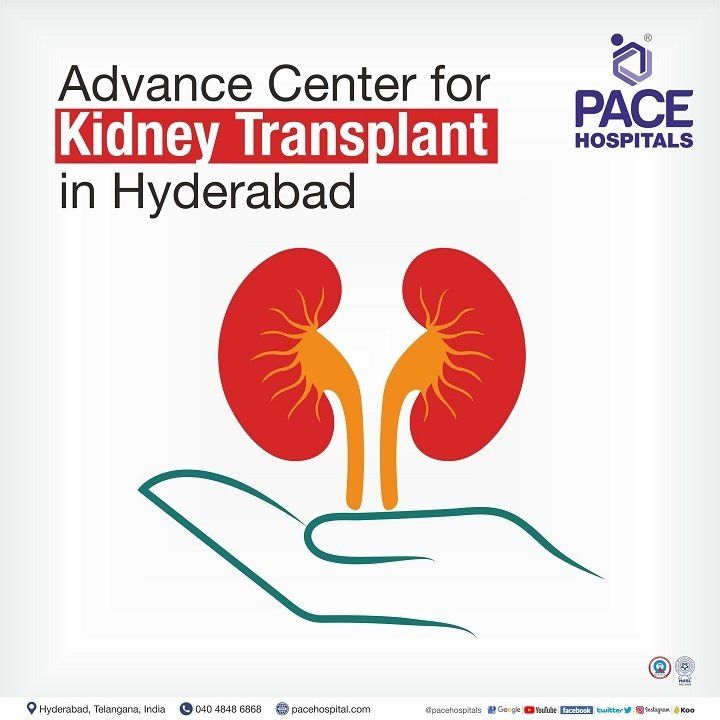हैदराबाद में किडनी ट्रांसप्लांट | प्रक्रिया, लागत और सफलता दर
We have team of the best kidney transplant surgeons and transplant nephrologists. They are having extensive experience in performing Living donor kidney transplant and Deceased donor kidney transplant (Cadaveric kidney transplant) with the high success rate.
We are one of the Advanced Centre for Kidney Transplant in Hyderabad backed up with team of the best kidney transplant surgeons, kidney transplant doctors, transplant nephrologists (kidney specialist doctor), interventional cardiologist & pulmonologist, endocrinologist, vascular surgeon, infectious disease specialist doctor, psychiatrist, paramedical staff, dietitian and physiotherapist in India.
Kidney Transplant Team at Pace Hospitals, Hyderabad, India evaluates the donor and recipient thoroughly before performing the kidney transplantation by doing medical tests and radiological investigations including Blood testing, Urine testing, CT Scan or MRI Scan to ensure the fitness of the recipient and the donor. Living donor kidney transplant followed by an extensive and detailed evaluation of the donor first because safety of donor is very important before giving fitness clearance for transplantation.
We do not provide the guarantee of obtaining kidney for transplantations. In case of unavailability of a matching kidney from living donor for transplant, the patient can get registered at PACE Hospitals for the procurement of a matching kidney from cadaver or deceased-donor for transplant. PACE Hospitals keeps greatest effort to ensure the obtainment of kidney but does not provide any guarantee. Kidney Transplantation will happen as per state and center govt. rules and regulations.
हैदराबाद, हाईटेक सिटी और मदीनागुडा में सर्वश्रेष्ठ किडनी ट्रांसप्लांट डॉक्टर
डॉ. विश्वम्भर नाथ
40 वर्षों का अनुभव
MBBS, MS (General Surgery), DNB (Urology), M.Ch (Urology) (CMC Vellore, Tamil Nadu)
Senior Consultant Urologist & Renal Transplant Surgeon
Dr. A Kishore Kumar
11 वर्ष का अनुभव
MD (Medicine) (JIPMER), DM (Nephrology) (AIIMS, New Delhi)
Nephrologist & Kidney Transplant Physician
किडनी प्रत्यारोपण विभाग
Department of Kidney Transplant at Pace Hospitals, provides extensive and highly notable quality of living donor and deceased donor kidney transplant. The department is backed up with multidisciplinary team of kidney transplant and dedicated kidney transplant ICU (intensive care units) that help to accomplish complex and complicated surgeries with high success rates.
Our team of kidney transplant surgeons, transplant nephrologists and kidney specialist doctors are highly qualified in performing complex surgeries and organ transplants and, they are having extensive experience to perform the surgery with accuracy and precision. Transplant team is backed up with The World’s First Universal Surgical Robotic System, latest laser treatment equipment, state-of-the-art facility and modern technology offering comprehensive treatment.
PACE Hospitals is considered as one of the Best Kidney Transplant Hospital in Hyderabad, Telangana, India. Our department of Kidney Disease treated many patients with conditions and diseases related to kidneys such as Acute kidney failure, Glomerulonephritis,
Chronic Kidney Disease, Polycystic kidney disease (PKD),
Diabetic Kidney Disease, Amyloidosis (amyloid disease), Hemolytic uremic syndrome (HUS), Alport syndrome - inherited inflammation of the kidneys (nephritis), Nephropathic Cystinosis, Focal segmental glomerulosclerosis (FSGS), Fabry Disease, Goodpasture Syndrome (Anti-GBM Disease) etc.
What is Kidney Transplant Procedure?
Kidney transplant meaning
A kidney transplant procedure is a surgical method to replace a diseased kidney with a healthy kidney from a donor. A deceased organ donor's kidney or a living donor's kidney may be used. Immediate family members or others who are a good match for the kidney transplant may be able to give one of their kidneys. This type of transplant is also called a live transplant. Kidney donors can live a long and healthy life with just one healthy kidney.
The majority of the time, a single kidney is transplanted into a recipient. In extremely rare cases, two kidneys are transplanted. Kidneys from a deceased donor may be an option. The old kidney(s) usually not removed and will be placed in the abdomen. However, the old kidney will be removed out of the patient’s body under the following scenarios:
- Infection that may spread to the patient’s new transplanted kidney.
- Untreated or uncontrolled hypertension caused by old kidneys.
- Back up of urine into the kidneys (urinary reflux).
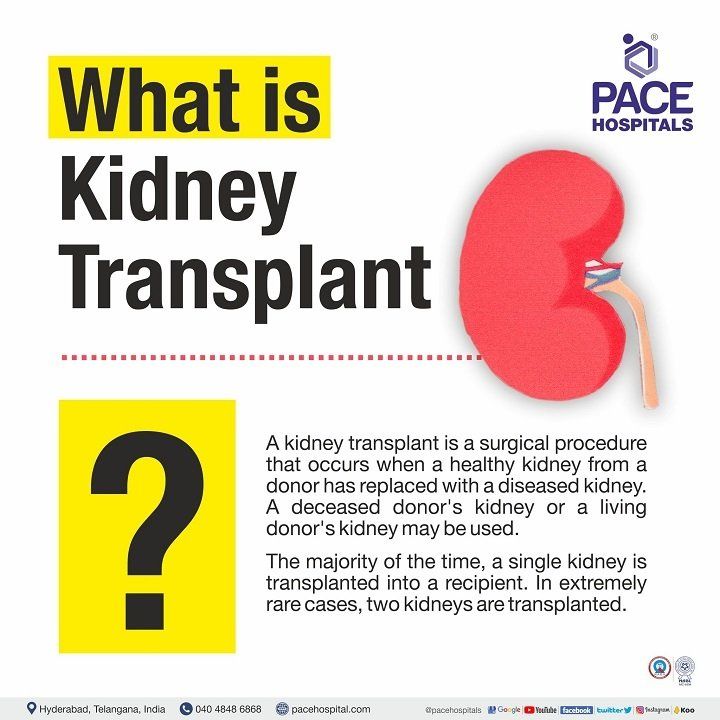
गुर्दा प्रत्यारोपण के लिए संकेत
Kidney transplant is indicated for an end-stage renal disease (ESRD) patient, who might have kidney failure (< 15% of kidney function or glomerular filtration rate) as a life-threatening ailment. To remove the excess waste and fluids from the body, the patient needs to have dialysis on a regular schedule. A kidney transplant can aid them by providing a complete stoppage of dialysis.
The kidney transplant is necessary in order to restore the normal kidney functions, such as:
- Removal of urea and other liquid wastes from the body. Urea is produced when protein-rich foods like meat, poultry, and certain vegetables are digested in the body.
- Maintenance of salts, electrolytes, and other blood components in the blood.
- Synthesis of erythropoietin, a hormone that helps red blood cell development.
- Regulation of blood pressure, fluids and acid-base balance.
- A kidney transplant may also be required if the patient was born with kidney problems, such as congenital kidney abnormalities.
Causes of End-stage renal disease (ESRD)
The ESRD can be caused by the presence of a number of kidney diseases, such as:
- Diabetes and high blood pressure can induce kidney failure (1st and most important cause)
- Urinary tract infections (UTIs) that occur on a regular basis
- Other hereditary illnesses, such as polycystic kidney disease
- Glomerulonephritis, or inflammation of the filtering units of the kidney, is a condition in which the filtering units become inflamed
- Haemolytic uremic syndrome (HUS) is a rare kidney failure condition
- Immune system disorders such as lupus and others
Types of Kidney Transplant
किडनी प्रत्यारोपण के प्रकार दाता और उसकी जीवित स्थिति पर आधारित होते हैं। इन्हें दो प्रकारों में वर्गीकृत किया जाता है:
- मृतक-दाता किडनी प्रत्यारोपण
- जीवित दाता किडनी प्रत्यारोपण
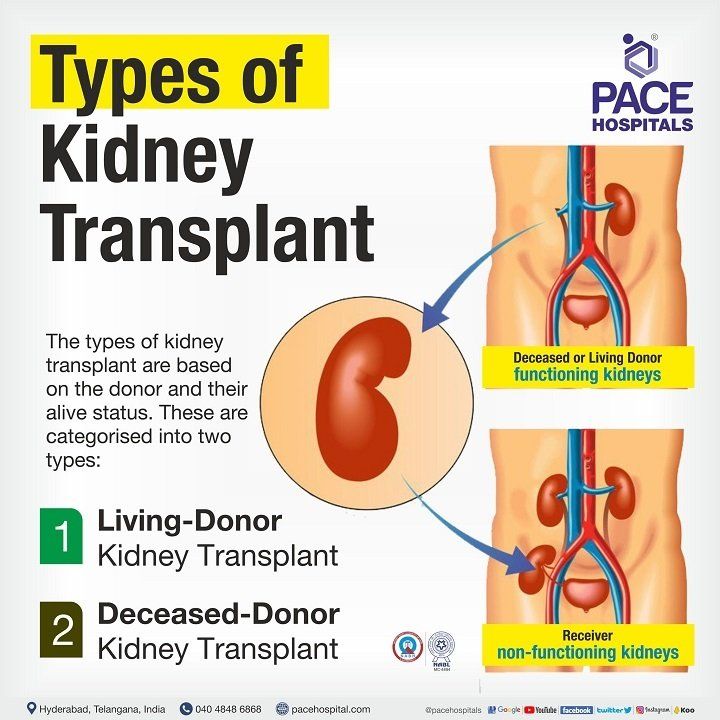
Deceased-donor kidney transplant or Cadaveric kidney transplant
मृतक दाता (ऐसा व्यक्ति जिसकी हाल ही में मृत्यु उस अंग से संबंधित कारणों से हुई हो जिसे प्रत्यारोपित किया जाएगा) किडनी प्रत्यारोपण को मृतक दाता से किडनी के सर्जिकल प्रत्यारोपण के रूप में वर्णित किया जाता है, जिसके मूल गुर्दे क्षतिग्रस्त नहीं हैं और सही तरीके से काम कर रहे हैं। मृतक दाता अंग आमतौर पर उन लोगों से प्राप्त किए जाते हैं जिन्होंने मृत्यु से पहले अंग दाता कार्ड पर हस्ताक्षर किए थे और अपने अंग दान करना चाहते थे। मृतक व्यक्ति के रिश्तेदार भी मृत्यु के समय मृतक दाता के अंग के दान की अनुमति दे सकते हैं।
मृतक दाता किडनी के प्रकार
मृतक दाता गुर्दे विभिन्न आकार और आकारों में आते हैं। इन शब्दों का उपयोग दाता अंगों की शारीरिक, जैव रासायनिक और सामाजिक विशेषताओं को दर्शाने के लिए किया जाता है। रोगी के पास इनमें से किसी भी या सभी अंगों को अस्वीकार करने का विकल्प होगा। मृतक दाताओं की आयु के आधार पर, उन्हें निम्न में वर्गीकृत किया जाता है:
- मानक मानदंड दाता (SCD)
- विस्तारित मानदंड दाता (ईसीडी)
- हृदय मृत्यु के बाद दान (डीसीडी)
- उच्च जोखिम वाले सामाजिक व्यवहार का इतिहास रखने वाले दाता
मानक मानदंड दाता (एससीडी): ये गुर्दे 50 वर्ष से कम आयु के ऐसे लोगों द्वारा दान किए गए थे, जिनकी मृत्यु विभिन्न स्थितियों, जैसे आघातजन्य चोटों या सेरिब्रोवैस्कुलर स्ट्रोक के कारण मस्तिष्क मृत्यु से हुई थी।
विस्तारित मानदंड दाता (ईसीडी): ये गुर्दे 50-60 वर्ष की आयु से अधिक के दाताओं द्वारा निम्नलिखित मानदंडों के अनुरूप दान किये जाते हैं:
- रक्तचाप में वृद्धि का इतिहास
- क्रिएटिनिन (गुर्दे का बायोमार्कर) स्तर सामान्य प्रयोगशाला मान (1.5 मिलीग्राम/डीएल) से अधिक है
हृदय मृत्यु के बाद दान (डीसीडी): वे दाता जो गंभीर और अपरिवर्तनीय मस्तिष्क की चोट से पीड़ित हैं, लेकिन आधिकारिक मस्तिष्क मृत्यु मानदंडों को पूरा नहीं करते हैं, उन्हें हृदय मृत्यु (डीसीडी) के बाद दाता माना जाता है। रोगी के दिल की धड़कन बंद हो जाने के बाद अंगों को निकाला जा सकता है।
उच्च जोखिम वाले सामाजिक व्यवहार का इतिहास रखने वाले दाता: ये वे लोग हैं जिनका यौन संचारित रोगों या नशीली दवाओं के सेवन का इतिहास रहा है, या जिन्होंने अपने जीवन में किसी समय एकाकी जीवन जिया है। अंग प्राप्ति के समय, इनमें से प्रत्येक दाता की संक्रामक रोगों के लिए जाँच की जाती है, और यदि कोई उच्च जोखिम पाया जाता है, तो उसे रोगियों या देखभाल करने वालों को दिया जाएगा।
Living-donor kidney transplant
जीवित दाता प्रत्यारोपण एक ऐसी सर्जरी है जिसमें एक स्वस्थ दाता की किडनी को शल्य चिकित्सा द्वारा गुर्दे की विफलता वाले व्यक्ति में प्रत्यारोपित किया जाता है। एक जीवित दाता आमतौर पर प्राप्तकर्ता के निकटतम परिवार का सदस्य होता है, जैसे कि माता-पिता, भाई-बहन या बच्चा; चाचा, चाची या चचेरा भाई; या यहां तक कि पति या पत्नी या दोस्त। अजनबी और अच्छे लोग जो किडनी की ज़रूरत वाले किसी व्यक्ति की मदद करना चाहते हैं, वे भी जीवित दाता किडनी प्रदान कर सकते हैं।
जीवित दाता किडनी प्रत्यारोपण से मृतक दाता किडनी प्रत्यारोपण की तुलना में कई लाभ मिलते हैं, जिनमें से सबसे महत्वपूर्ण है सफलता दर का कहीं अधिक होना। इसके अलावा, इसके निम्नलिखित कारण हैं।
- जीवित दाता से किडनी ट्रांसप्लांट आमतौर पर तुरंत काम करता है। मृत दाता की किडनी को सामान्य रूप से काम करने में कई दिन या सप्ताह लग सकते हैं।
- जीवित दाता प्रत्यारोपण को निर्धारित किया जा सकता है, जिससे प्राप्तकर्ता और दाता दोनों को तैयारी के लिए समय मिल सके। मृतक दाता की किडनी की उपलब्धता संदिग्ध होगी, लेकिन अगर यह उपलब्ध है, तो सर्जरी को जल्द से जल्द निर्धारित किया जाना चाहिए।
- तत्काल किडनी दानकर्ता (रक्त संबंधी) के मामले में, प्रत्यारोपण अस्वीकृति की संभावना कम होती है।
- मृत दाता किडनी को खोजने में लगने वाला समय (जिसमें तीन से पांच वर्ष तक का समय लग सकता है) आमतौर पर जीवित दाता किडनी की तुलना में अधिक होता है।
Kidney Transplant contraindications
The absolute contraindications or non-eligibility for the person donating (donor) the kidneys are as follows:
- Under the age of 18 and above 70 years
- Diagnosed with diabetes, active malignancy, albuminuria and psychiatric disorders
- Presence of human immunodeficiency virus (HIV)
- Obesity (BMI > 40 kg/m2)
- Glomerular filtration rate (GFR) less than 70 mL/min/1.72m2
- Hypertensive treatment, consisting of more than one medication
- Presence of horseshoe kidneys (formation of the horse-shaped kidney by infusion of two kidneys)
Absolute contraindications or ineligibility for recipients, if they are:
- Inability to tolerate surgery due to the presence of severe lung or heart disease
- Having active malignancy, active drug abuse and active infection
- Having uncontrolled psychiatric disease
Relative contraindications or ineligibility for recipients include:
- Patient with a history of dialysis and medication noncompliance
- Presence of psychiatric problems and frailty (condition of being delicate and weak)
- Patients with limited life expectancy (having less than the anticipated waiting time
भारत में किडनी प्रत्यारोपण की सफलता दर
The kidney transplant procedure success rate in India is reported to be one of the highest in the world, with an estimated over 90% kidney transplant success rate for 7500 kidney transplantations per year. Presently, 90% of kidney transplants are obtained from living donors, and only 10% are from deceased donors (patients who died due to brain stroke or accidents).
Factors that might be associated with kidney success rate:
- Choice of a hospital: A well-established center equipped with advanced technology, good hygiene practices / policies and vastly experienced transplant nephrologists or kidney transplant surgeons should be a preferred choice.
- Kidney compatibility: Biological compatibility plays a vital role in the success rate of kidney transplants. It can be determined through a type of blood group, tissue types and crossmatching.
- Post-surgery complications: The presence of post-surgery complications such as infections are a higher risk of diminishing success rate.
- Age: Based on the type of donor, the kidney transplant success rate by age can be influenced. For instance, a 5-year survival rate for deceased-donor kidney transplant had reported 74.3% success in geriatrics (above 65 years) and nearly 96% in ages between 18 and 34 years when compared to 83.9% for living-donor kidney transplant in geriatrics and 97.8% in age between 18 and 34 years.
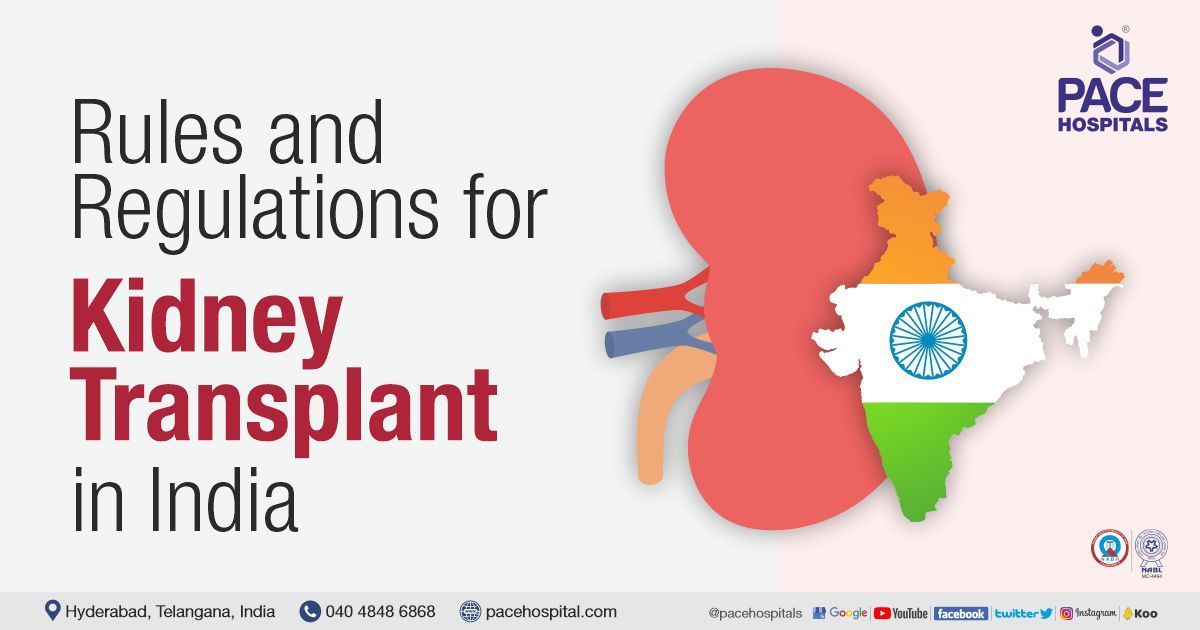
Preparing for a kidney transplant surgery
Preparing for a kidney transplant mainly comprises finding a compatible partner.
A living or deceased kidney donor can be related or unrelated to the patient. When determining if a kidney donor will be a good match for the patient, the transplant team will take into account a number of variables. As a part of it, the following tests can be used to see if a donated kidney is compatible with the patient:
Blood typing: Blood typing is a method of determining the compatibility between the donor and recipient’s blood groups. This test detects blood antibodies that react to various blood types. Blood-type incompatible transplants are also possible, where they require additional medical therapy both before and after the procedure to limit the chance of organ rejection; these are known as ABO incompatible kidney transplantation.
Tissue typing: If the patient’s blood types are compatible, a tissue typing test known as human leukocyte antigen (HLA) typing will be performed. This test compares genetic markers that predict how long a donated kidney will last. The patient’s body is less likely to reject the organ if it is a good match.
Crossmatch: A small amount of the patient’s (recipient’s) blood is mixed to donor's blood in the lab for the third and final matching test. Antibodies in the patient’s blood are tested to see if they react to antigens in the blood of the donor. A negative crossmatch suggests they're compatible, and the patient’s body won't reject the donor kidney as easily. Positive crossmatch kidney transplants are also possible, but they necessitate additional medical care, both pre- and post-procedure, to limit the danger of the patient’s antibodies responding to the donor organ.
Matching age, kidney size, and infection exposure are some of the other characteristics the transplant team may evaluate while looking for the best donor kidney for the patient.
If the patient is on dialysis, the patient will have dialysis before the surgery. The patient needs to fast for 8 hours for a planned living kidney transplant. In case of a deceased transplant, the patient needs to fast from the time the kidney has become available.
Based on the patient's condition, the renal transplant surgeon might suggest any other suggestions.
किडनी प्रत्यारोपण सर्जरी के दौरान क्या अपेक्षा करें?
जब अस्पताल में चेक-इन करने का समय होगा, तो रीनल सर्जन मरीज को सूचित करेगा। सर्जन मरीज को प्रक्रिया के बारे में बताएगा, और मरीज को हस्ताक्षर करने के लिए एक सूचित सहमति दस्तावेज दिया जाएगा, जो किडनी ट्रांसप्लांट सर्जन को किडनी ट्रांसप्लांट सर्जरी के साथ आगे बढ़ने के लिए अधिकृत करेगा। हस्ताक्षर करने से पहले, मरीज को सहमति दस्तावेज को अच्छी तरह से पढ़ना चाहिए और रीनल ट्रांसप्लांट सर्जन से कोई प्रश्न पूछना चाहिए।
- मरीज़ को ड्रेस बदलने के लिए एक सर्जिकल गाउन उपलब्ध कराया जाएगा।
- रोगी की बांह या हाथ में एक अंतःशिरा लाइन डाली जाएगी, जिसके माध्यम से दवाएं और शामक दवाएं दी जाएंगी।
- सर्जरी के दौरान, सर्जिकल टीम मरीज़ की हृदय गति और रक्तचाप पर नज़र रखेगी। सर्जरी वाली जगह को ऑपरेशन के लिए पर्याप्त रूप से साफ़ किया जाना चाहिए (यदि ज़्यादा बाल हों तो उन्हें हटाना)।
किडनी प्रत्यारोपण ऑपरेशन प्रक्रिया:
- रोगी के मूत्राशय में मूत्र कैथेटर डाला जाएगा।
- मरीज को ऑपरेशन टेबल पर पीठ के बल लिटाया जाएगा।
- रोगी के फेफड़ों में मौखिक मार्ग (मुंह) के माध्यम से सीधे एक ट्यूब डाली जाएगी, जिसके माध्यम से रोगी को वेंटिलेटर के माध्यम से कृत्रिम श्वास प्रदान की जाएगी, जिसके साथ डाली गई ट्यूब जुड़ी होगी।
- सर्जरी स्थल के ऊपर की त्वचा को साफ करने के लिए एंटीसेप्टिक घोल का उपयोग किया जाएगा।
- सर्जन मरीज के पेट के एक तरफ के निचले हिस्से में चीरा लगाता है और नई किडनी को शरीर में डालता है। प्रत्यारोपण से पहले, गुर्दा सर्जन दाता की किडनी का निरीक्षण करेगा।
- जब डोनर की किडनी तैयार हो जाती है, तो उसे पेट में प्रत्यारोपित किया जाएगा। मरीज को डोनर से एक नई किडनी मिलेगी, जहां बाएं डोनर की किडनी को मरीज के दाएं तरफ और दाएं डोनर की किडनी को मरीज के बाएं तरफ रखा जाएगा। इस प्रकार मूत्राशय से मूत्रवाहिनी के लिंक तक जल्दी और आसानी से पहुंचा जा सकता है।
- दाता (नई किडनी) की वृक्क धमनी और वृक्क शिरा को क्रमशः प्राप्तकर्ता (रोगी) की बाह्य श्रोणि धमनी और शिरा से जोड़ दिया जाएगा।
- धमनियों और शिराओं को जोड़ने के बाद सिवनी लाइनों पर रक्तस्राव के संकेतों के लिए रक्त वाहिकाओं (धमनियों और शिराओं) के माध्यम से रक्त प्रवाह की जांच की जाएगी।
- एक दानकर्ता मूत्रवाहिनी, जो एक ट्यूब होती है जो गुर्दे को मूत्राशय से जोड़ती है, प्रत्यारोपित की जाएगी।
- चीरा बंद करने के लिए टांके या सर्जिकल स्टेपल का इस्तेमाल किया जाएगा। चीरे वाली जगह पर सूजन को ड्रेन डालकर कम किया जा सकता है। सर्जरी वाली जगह पर साफ पट्टी या ड्रेसिंग लगाई जाएगी।
किडनी प्रत्यारोपण सर्जरी के बाद क्या अपेक्षा करें?
After kidney transplant procedure steps:
- The patient will be shifted to the recovery room for kidney transplant post surgery care. The patient may be moved to the ICU (intensive care unit) for close monitoring once the patient's blood pressure, pulse, and respiration have stabilised. As the patient recovers, they will be moving out of ICU to the general room.
- A kidney transplant from a living donor may begin producing urine right away. A cadaver kidney's urine output may take longer. It's possible that the patient may keep on dialysis until the urine output returns to normal.
- The patient will be placed with a catheter in the bladder to remove the urine. The drained volume aid in measuring the new kidney function.
- The patient will be on intravenous fluids until the patient can take in enough liquids and food on their own.
- The renal surgeon team will keep a close eye on how anti-rejection medicines are working on the patient to make sure that the patient is taking appropriate medication.
- Regular blood samples will be taken to monitor the new kidney's health and other organs and systems, such as the liver, lungs, and blood system.
- The patient will slowly move to solid foods, and they will be on limited fluids in order to prevent overpressure.
- The patients should be able to move around the next day after the treatment. Several times a day, the patients should get out of bed and move around.
- As directed by the healthcare professional, the patient should take pain medication for soreness.
- The patient needs to avoid using aspirin or other pain relievers that may raise the risk of bleeding.
- At the time of discharge, the patient will be provided with counselling related to care for the incision, the food and the medication.
गुर्दा प्रत्यारोपण प्रक्रिया की जटिलताएं
Significant complications can arise during kidney transplant surgery, and they can include:
- Bleeding and clotting in blood vessels
- Blockage of the ureter tube that connects the kidney and bladder
- A donated kidney fails or is rejected
- A contagious disease that could be spread by organ donation, such as cancer or illness
- Cardiovascular disease, cerebrovascular accident and death
- Infection to the surgical site
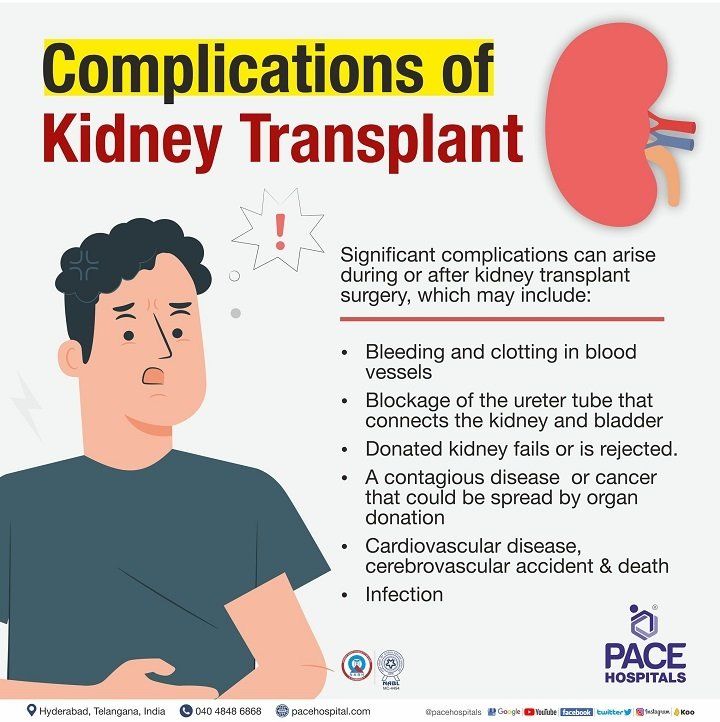
एंटी-रिजेक्शन दवा के दुष्प्रभाव
Significant complications can arise during kidney transplant surgery, and they can include:
- Bleeding and clotting in blood vessels
- Blockage of the ureter tube that connects the kidney and bladder
- A donated kidney fails or is rejected
- A contagious disease that could be spread by organ donation, such as cancer or illness
- Cardiovascular disease, cerebrovascular accident and death
- Infection to the surgical site
Post-kidney transplant patient questions
- क्या मेरी पुरानी किडनी, जो अंदर बची हुई है, कोई समस्या पैदा करेगी?
- क्या मेरी किडनी सफलतापूर्वक बदल दी गई है?
- मैं अपने सामान्य कार्य हेतु कब जा सकता हूँ?
- मुझे कितना तरल पदार्थ पीना चाहिए?
- क्या मुझे इसके बाद डायलिसिस पर रहना चाहिए?
- सर्जरी से पहले बंद की गई मेरी पुरानी दवाइयां कब फिर से शुरू करनी चाहिए?
- मेरे टाँके कब हटाए जायेंगे?
- छुट्टी के समय: फॉलो-अप के लिए कब वापस आना है?
किडनी ट्रांसप्लांट मरीज़ की गवाही
Bangladesh Patient, age 32-year-old with chronic kidney disease (CKD) was successfully treated with kidney transplantation and with subsequent urine examination the patient shown improvement without the presence of any proteinuria, hematuria, fever and graft tenderness.
Frequently asked questions:
किडनी प्रत्यारोपण कौन करवा सकता है?
किडनी प्रत्यारोपण बच्चों से लेकर बुजुर्गों तक विभिन्न आयु वर्ग के व्यक्तियों के लिए उपलब्ध है।
- इस प्रक्रिया को करवाने के लिए मरीज का स्वास्थ्य अच्छा होना चाहिए। साथ ही, मरीज को कैंसर और संक्रमण से मुक्त होना चाहिए।
- यह सुनिश्चित करने के लिए कि कोई व्यक्ति प्रत्यारोपण के लिए एक अच्छा उम्मीदवार है, उन्हें एक संपूर्ण चिकित्सा और मनोवैज्ञानिक मूल्यांकन से गुजरना होगा। मूल्यांकन प्रत्यारोपण से पहले संबोधित किए जा सकने वाले किसी भी मुद्दे का पता लगाने में सहायता करता है। प्रत्यारोपण अधिकांश लोगों के लिए एक उत्कृष्ट चिकित्सा विकल्प है।
Who cannot get a kidney transplant?
Many patients believe they are too old for a transplant; however, age is not a consideration in transplant eligibility if the patient is otherwise healthy. Other problems, however, may preclude individuals from receiving a kidney transplant, such as:
- Life expectancy is currently less than five years.
- Cancer that has recently occurred (other than most skin cancers)
- Heart illness that is incurable
- Psychiatric disorder that is incurable
- Dialysis appointments are missed, or the machine is turned off early.
- Substance abuse that is ongoing (alcohol or drugs)
When should I get a kidney transplant?
The earlier the patient receive a kidney transplant, the better is the survival. The nephrologists and the kidney transplant team will select the ideal time for the patient to have a transplant.
How long does a kidney transplant last?
The success rate of kidney transplants is very high, at around 95%. The typical lifespan of a transplant from a living donor is 15-20 years, but a transplant from a deceased donor is just 10-15 years. In the event of a failed transplant, the patient may begin or resume dialysis treatment and / or look for a second organ donor.
मैं काम पर कब लौट सकता हूँ?
The duration of time it takes the patient to return to work is determined by the patient recuperation, the type of work the patient does, and any other medical issues the patient may have. After their transplant, many people are able to return to work after eight weeks or more. The transplant team will assist the patient in determining when the patient is ready to resume work.
What are the advantages of a kidney transplant over dialysis?
While dialysis is a life-saving procedure, it only performs roughly 10% of the functions that a healthy kidney does. Dialysis might induce various health concerns as a result of its effects on the body. The maximum life span after a kidney transplant is estimated to be an average of 10 - 15 years more than that of those who remain on dialysis (Hemodialysis or
Peritoneal Dialysis (PD)). In addition, the majority of people claim that transplantation improves their quality of life significantly.
What happens to the old kidneys after the transplant?
The diseased kidneys are not removed in the vast majority of instances. The damaged kidneys may need to be removed for one of the following three reasons:
- Pain or infection that might be spreading to the transplanted kidney
- If the natural kidneys are causing uncontrollable hypertension
- Urine backup in the kidneys (a condition called reflux)
How many kidney transplants can a person have?
The patient can have more than one transplant; it depends on their age and the number of times their body has been through the process. Two, three, or even four kidney transplants can be performed on a patient during their lifetime. The renal surgeon will make the call by analysing the risk-to-reward ratio based on the patient’s condition.
हैदराबाद, भारत में शीर्ष 10 किडनी प्रत्यारोपण अस्पताल कौन से हैं?
पेस हॉस्पिटल्स हैदराबाद, भारत के शीर्ष 10 किडनी प्रत्यारोपण अस्पतालों में से एक है, जो उच्च सफलता दर और 24x7 परेशानी मुक्त व्यापक प्रत्यारोपण पूर्व और बाद के समर्थन के साथ जीवित दाता किडनी प्रत्यारोपण और मृतक दाता किडनी प्रत्यारोपण (कैडेवेरिक किडनी प्रत्यारोपण) की सुविधा प्रदान करता है।
How long can a person with a kidney transplant live?
आम तौर पर, जिन रोगियों का किडनी ट्रांसप्लांट सफल रहा है, वे अपने जीवन की गुणवत्ता में सुधार देख सकते हैं। जीवित रहने की अवधि ट्रांसप्लांट में इस्तेमाल किए गए डोनर किडनी के प्रकार से निर्धारित होती है। जीवित डोनर की किडनी आम तौर पर 12-20 साल तक काम करती है, जबकि मृत डोनर की किडनी केवल 8-12 साल तक काम करती है।
हैदराबाद, तेलंगाना में किडनी प्रत्यारोपण के लिए डोनर कैसे प्राप्त करें?
Organ recipient can get the kidney from a living donor in immediate family members. In case there is no living donor, person awaiting a transplant need to register at donor waiting list on AACT, Jeevandan for cadaver donor through an Organ Transplant Centre (OTC) in Hyderabad, Telangana.
Jeevandan is a comprehensive cadaver organ transplantation scheme initiated by The Government of Telangana, proposed by the Cadaver Transplantation Advisory Committee (CTAC) to give a fillip to organ transplantation. Organ recipient registration will be done in two categories.
- Super urgent transplantation
- Elective transplantation
Jeevandan Cadaver Transplanatation Programme, Telangana priorities the list of cadaver donors. First priority shall be given to an Organ Transplant Centre (OTC) where the deceased donor is located. If, for any reason, the OTC is not able to accept the organ, the organ will be passed on to the general pool.
Super urgent transplantation registration is prioritized over elective list and general pool.
Which is the best kidney transplant hospital in Hyderabad, India?
पेस हॉस्पिटल्स हैदराबाद, भारत में सर्वश्रेष्ठ किडनी प्रत्यारोपण अस्पतालों में से एक है, जो बहु-विषयक वयस्क और बाल चिकित्सा किडनी प्रत्यारोपण टीम और समर्पित किडनी प्रत्यारोपण आईसीयू (गहन देखभाल इकाइयों) द्वारा समर्थित है और सीआरआरटी, दुनिया की पहली यूनिवर्सल सर्जिकल रोबोटिक प्रणाली, नवीनतम लेजर उपचार उपकरण, अत्याधुनिक सुविधा और आधुनिक प्रौद्योगिकी से सुसज्जित है।
How much does kidney transplant cost in India?
The average cost of a Kidney Transplant in India is approximately Rs. 8,75,000 (eight lakh seventy-five thousand). However, Kidney Transplant price in India ranges vary from Rs. 6,20,000 to Rs. 12,75,000 (six lakh twenty thousand to twelve lakh seventy-five thousand) and depends upon multiple factors and differs from case to case. However, cost may vary depending upon the different hospitals in different cities.
हैदराबाद में किडनी ट्रांसप्लांट की लागत क्या है?
Kidney Transplant cost in Hyderabad ranges vary from Rs. 6,50,000 to Rs. 9,00,000 (six lakh fifty thousand to nine lakh). However, price or cost of kidney transplant in Hyderabad depends upon the multiple factors such as age, patient condition, blood group matching, associated conditions, room selection in hospital and, CGHS, ESI, EHS, TPA-insurance or corporate approvals for cashless facility.

